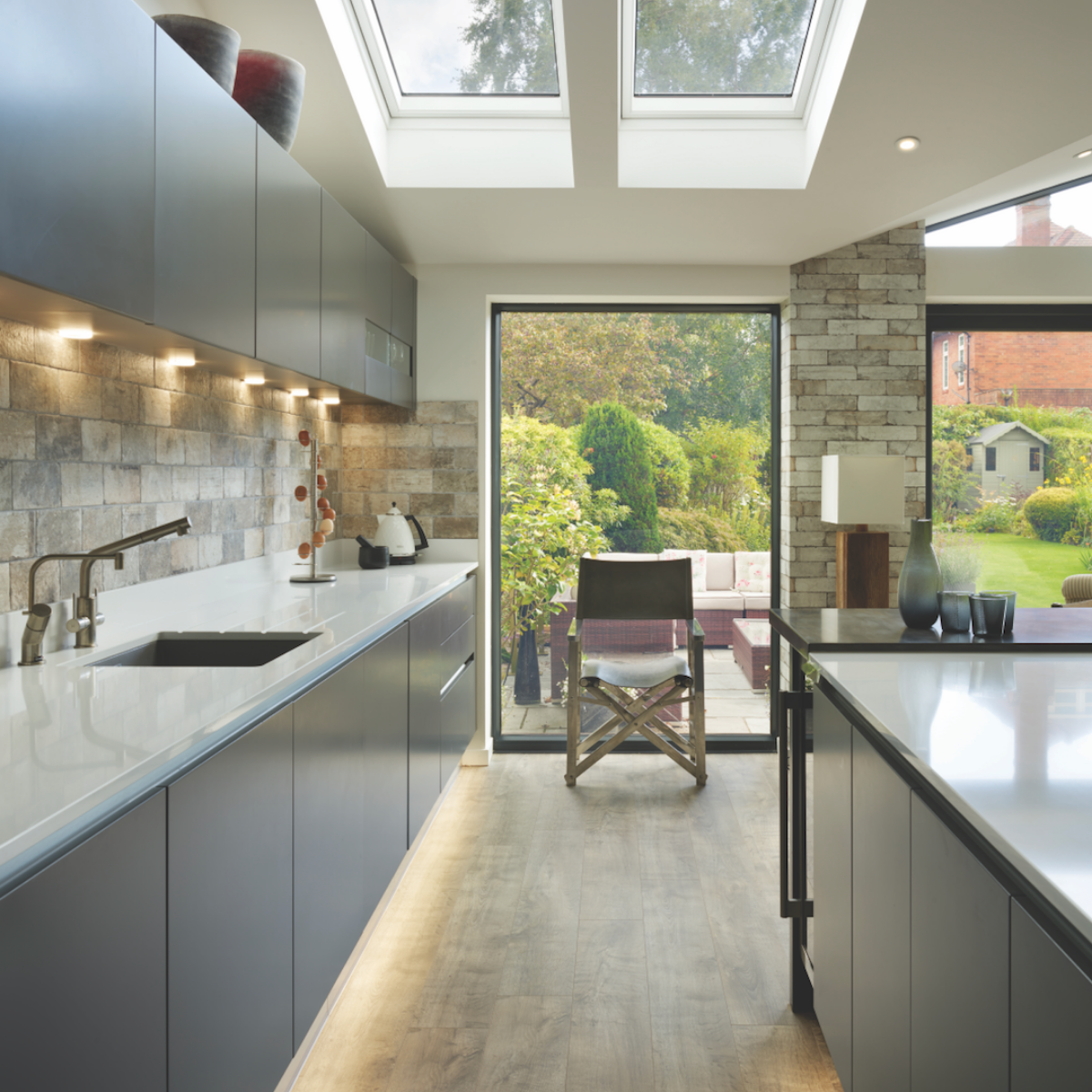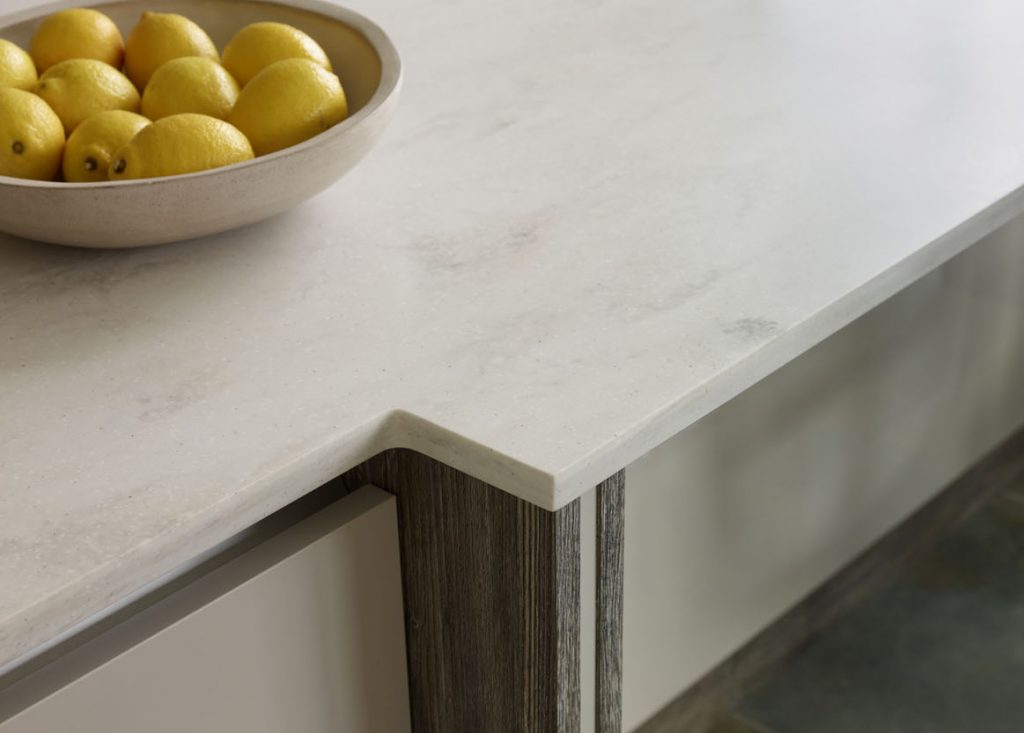As well as transforming the look and style of your kitchen, worktops are one of the most hard-working features of your space. They will undoubtedly play a role in the durability of your kitchen, significantly impacting the longevity of your design. Furthermore, even a mid-priced worksurface will likely account for a substantial proportion of your budget. And so, with all these factors in mind, it’s certainly worth giving some careful consideration to which worktop material is right for you and your project before going too far down the line with your plans.
At Cambridge Kitchens & Bathrooms, we’ve been designing and installing exceptional bespoke kitchens for over 40 years and have gained an excellent understanding of the different worktop materials and their properties. To help you understand the options available and ensure you make the right choice for your home, we’ve put together this comprehensive guide. For more information, please don’t hesitate to get in touch or pop into our Cambridge showroom.
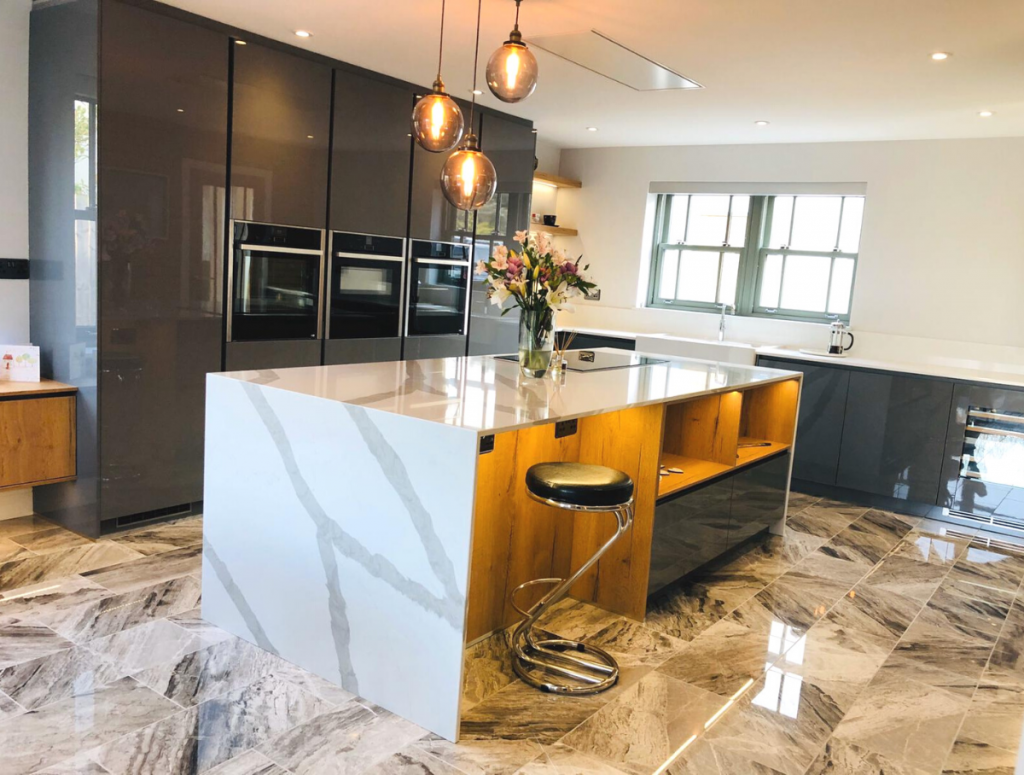
Things To Consider
Before discovering the various worktops materials available and learning about their different characteristics and properties, it’s worth taking a moment to consider your individual requirements and how they will affect your decision.
How Do You Use Your Kitchen?
If you love cooking and regularly put your kitchen through it’s paces, you’ll certainly want to choose a highly durable worktop material. With their strong, cool to the touch surface, natural stone and quartz worktops are often favoured by bakers as they come in handy when tempering chocolate and rolling pastry. Cooking ingredients like turmeric, beetroot, wine, chilli, and coffee can easily stain certain surfaces; this is something to be aware of when making your choice. Alternatively, if you tend to cook from scratch less regularly and find hosting a more laidback affair, you may wish to place more emphasis on the look and style of your worktop material.
What Is Your Budget?
Different worktop materials can vary substantially when it comes to price, and so you will need to outline your budget and weigh up just how much of your overall spend you want to allocate to your worksurfaces. If the durability of your worktops is particularly important, you may choose to invest in a good quality material and make some savings elsewhere. If you’re understandably unsure how best to allocate your budget, we recommend contacting your trusted local kitchen design specialists.
How Much Maintenance Are You Willing To Do?
If you struggle to find the time to mow the lawn, then you might want to rethink whether a wood or natural worktop is the right choice for you, as both require varying levels of maintenance. Likewise, if you have a busy family life, it’s to be expected that the odd spillage will slip through the net, meaning a trusty stain-resistant worktop would probably be the wiser choice. It’s always best to be realistic about your lifestyle and budget when deciding which worktop material is right for you.
A Quick Overview Of Worktop Materials
Affordable- Laminates and wood are the most cost-effective worktop options. Laminate is substantially more hardwearing and low maintenance than wood.
Mid-range- Though they can each vary in price depending on the brand, pattern, and quality, granite and solid surface worktops are available to suit most mid-range budgets. Granite is certainly the more durable option; however, acrylic solid surface worktops offer fantastic design flexibility.
High End– Quartz and compact surface worktops make two of the most remarkably durable and stylish options available. However, they do command a higher price tag, with compact surfaces such as Dekton proving the most expensive.
Laminate Worktops
A rigid resin sheet depicting your desired worktop finish, for example, stone or wood, is fused over a length of fibreboard or chipboard. Cheap and old-fashioned laminates have gotten a bad rap over the years due to their poor quality and unconvincing appearance. However, technology has since moved on, meaning there is a much better selection of stylish, high-quality laminates to choose from.
Pros
Available in a wide variety of designs and thicknesses, there are plenty of styles to suit your kitchen. Laminate worktops are the most affordable option and are cheap and easy to fit. They generally have good stain resistance and are straightforward to clean and maintain. Scratch and heat resistance and overall durability can vary depending on the quality of the laminate.
Cons
Their chipboard core can be affected by water if not sealed properly. You will need to have an overmount sink fitted to prevent water from penetrating any exposed edges. Their durability and looks are dependent on the quality of the brand you choose.
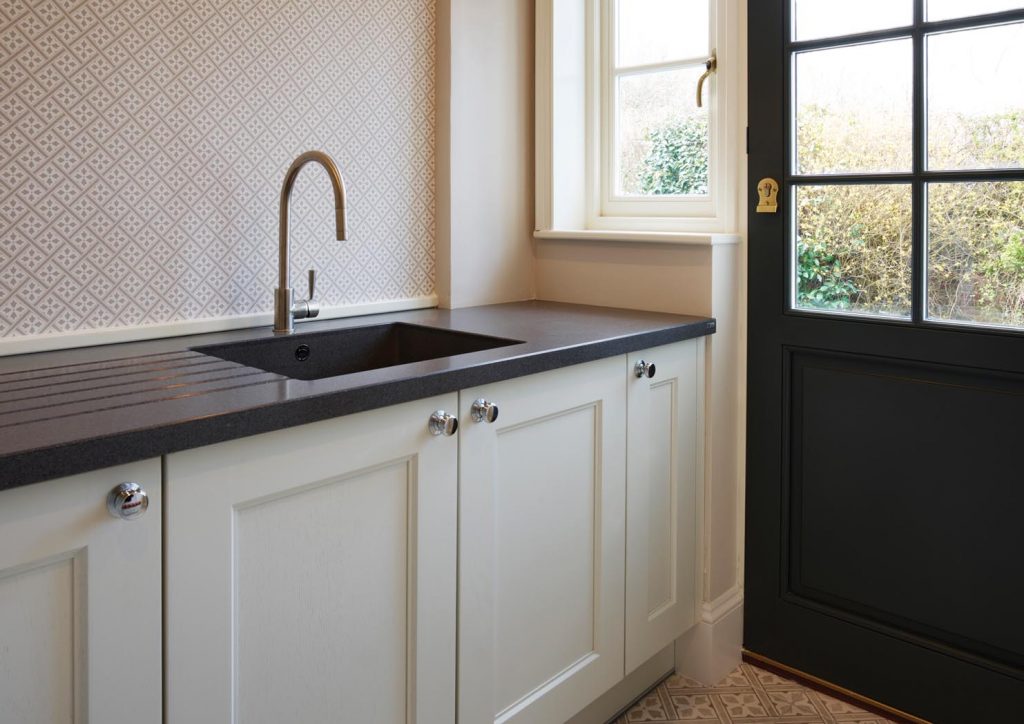
Compact Laminates
Unlike traditional laminates, compact laminates don’t have a chipboard core. They are made by compressing multiple layers of resin-soaked paper. Eliminating the chipboard core makes them fully water-resistant and much more durable.
Pros
Compact laminates are highly durable. They are waterproof, stain-resistant, generally hardwearing, and highly hygienic. They make it possible to install an undermount sink, and, because they are the same material all the way through to their core, you no longer need unsightly and vulnerable edging restricting your design.
Cons
They require specialist knowledge to fit and are only available in 12mm thickness which may limit your design. Your choice of colours and finishes will also be limited.
Wood Worktops
Fairly obviously, wood worktops are made of natural timber. They are commonly constructed of multiple staves glued together to add stability and prevent warping. Tops can also be made with full-length staves for a more luxurious look.
Pros
Available in a variety of colours, from light beech to rich walnut, wood is prized for its beautiful natural warmth and character. Depending on the style you choose, wood worktops can make an affordable choice and are convenient to install. They can also easily be sanded down and repaired if damaged.
Cons
Wood is highly vulnerable to water which can cause problems with swelling and mildew behind your sink. Wood worktops also scratch and stain easily and offer poor heat resistance. You will need to regularly sand and oil your worktops to keep them in good condition. Rather than opting for solid timber worktops throughout your space, wood can make a good choice as a kitchen island top or breakfast bar.
Granite Worktops
As a natural material, granite is mined all around the world, with different countries producing beautiful, unique patterns and colours that can vary in price.
Pros
With each slab having its own individual pattern and organic details, the natural characteristics of granite make it an incredibly beautiful and highly desirable material. Granite is extremely hard and scratch-resistant. It also has a high tolerance for heat, though we would always recommend using trivets in case of thermal shock.
Cons
Natural stone is porous, and while many granites are sealed to reduce their porosity and improve their stain resistance if you have a light-coloured granite, you will still need to be careful and mop up spillages quickly. Some granites will need resealing regularly, depending on the manufacturer’s guidance. Granite is also at risk of chipping and requires a lengthy professional template and fit installation process where the material is measured and cut to suit.
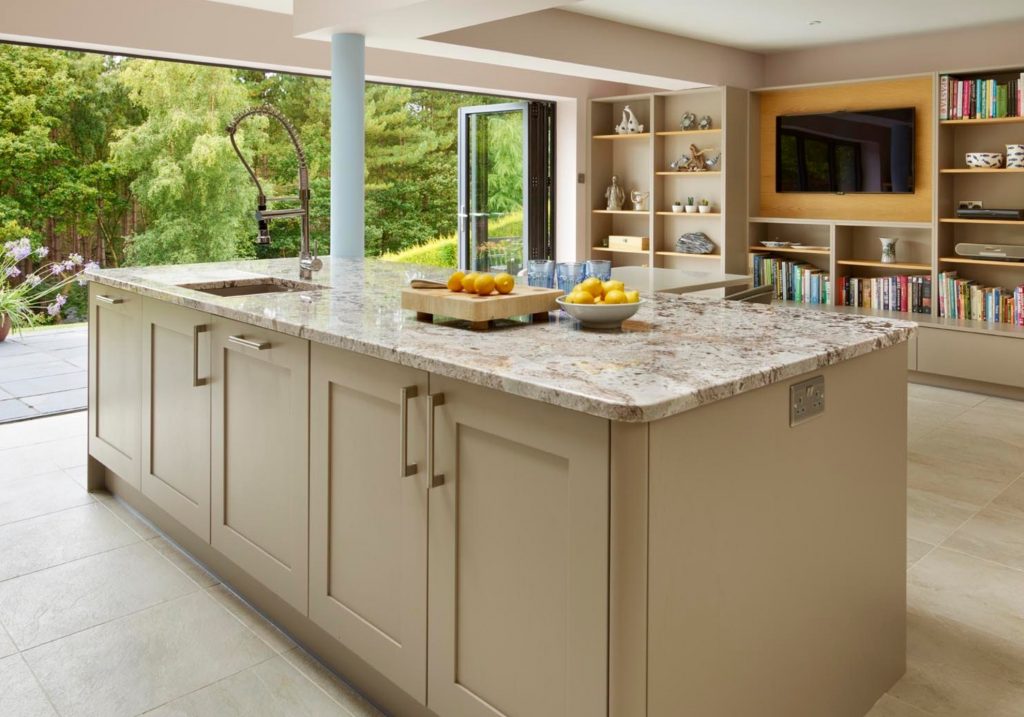
Acrylic Solid & Solid Surface Worktops
Including brands such as Minerva, Maia and Mistral, acrylic solid surface worktops are produced by forming a mix of acrylic polymers/resins, natural materials and colourants into sheets; these sheets are then moulded to a chipboard base similarly to laminates. Solid acrylic worktops like Corian and HI.MACS are produced using a similar composition of acrylics, minerals and dyes, however, they are fabricated into solid sheets rather than mounted to a chipboard core, making them a more expensive though equally more versatile option.
Pros
Both solid and solid surface acrylic worktops allow you to achieve completely seamless joins. Though structurally different, solid surface worktops can be fabricated by the manufacturer to include undermount sinks and drainer grooves. Solid acrylic worktops offer much greater design flexibility as they can be Thermo moulded into virtually any shape or form. Completely non-porous and free of joins, both solid and solid surface acrylics are visually impressive, hygienic and easy to clean.
Cons
The resin content in acrylic worktops means they are only available in a matt finish. They also scratch relatively easily and melt at temperatures higher than 100 degrees Celsius. However, bearing in mind, we would always recommend using a chopping board and heat trivets with any worktop material, you may not feel this is an issue. Fortunately, unlike laminate and granite, any damage can be repaired.
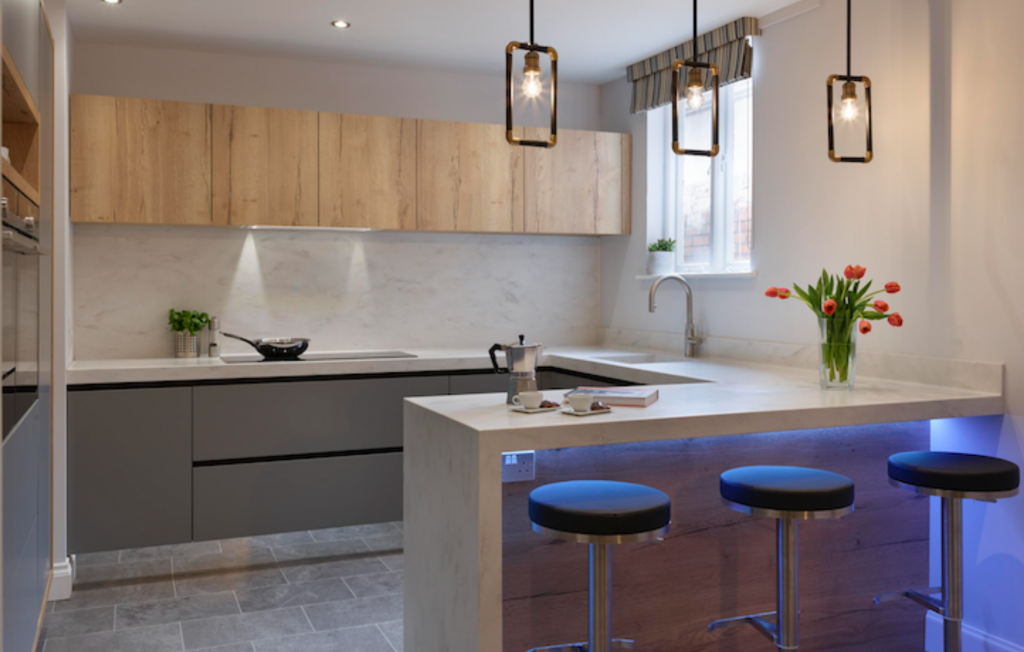
Quartz Worktops
You would be forgiven for thinking quartz is a natural stone like granite or marble, in fact, it is a manmade material composed of around 80-90% natural granulated quartz mixed with resin to bind it and form a slab. The addition of resin eliminates some of the issues associated with natural stone, such as porosity and brittleness.
Pros
Quartz boasts the same impressive toughness and heat resistance as granite whilst also offering fantastic stain resistance. Manufacturers are able to create a wide-ranging and highly attractive variety of patterns and colours to choose from.
Cons
Good quality quartz tends to be more expensive than laminate, wood, granite, and acrylic worktops. As a predominantly natural surface, it doesn’t have the same alluring depth as granite and will need to be templated and cut by the manufacture, adding a week or two to your installation time.
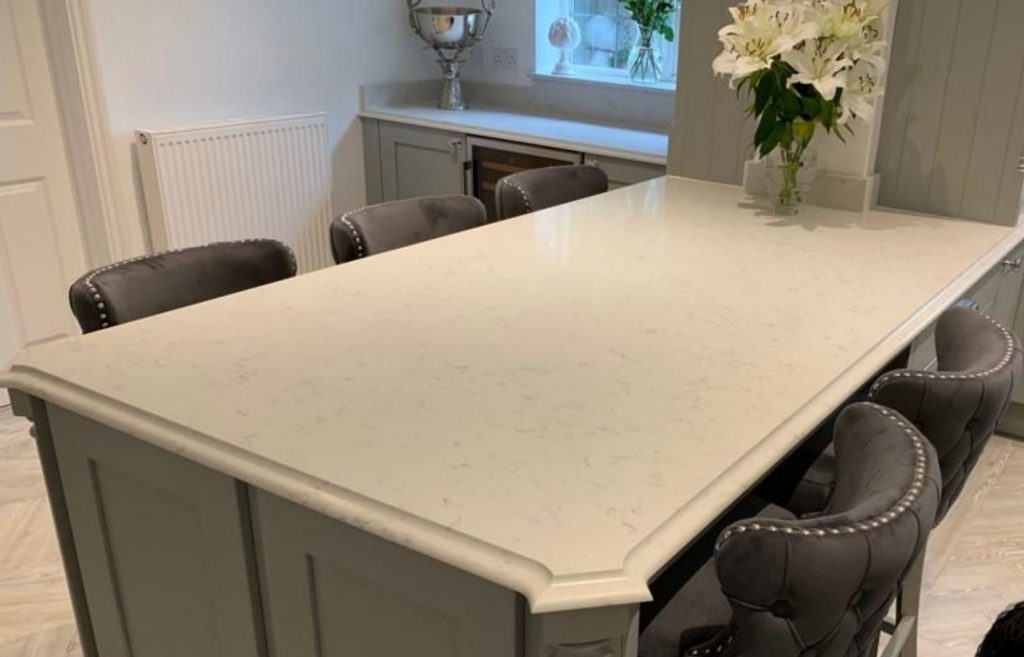
Compact Surface Worktops
Produced most notably by Dekton as well as Neolith and Lapitec, compact surface worktops are one of the newest materials to join the kitchen market. They are manufactured using a state-of-the-art process called Sinterised Particle Technology; this is where glass, porcelain and quartz particles are fused together under extreme pressure and heat- the result- a virtually indestructible worktop.
Pros
Five times stronger than granite, compact surface worktops are the toughest and most durable option available. Their solid construction allows you to include undermount sinks and draining grooves, and they come in a great variety of designs and thicknesses.
Cons
Unfortunately, if you’re looking for an all-singing and all-dancing worktop, you can expect to pay the price. The innovation and materials behind compact surface worktops make them the most expensive option on the market. Also, it’s worth bearing in mind that the surface pattern is usually printed onto the top layers, meaning the edges will be a block colour.
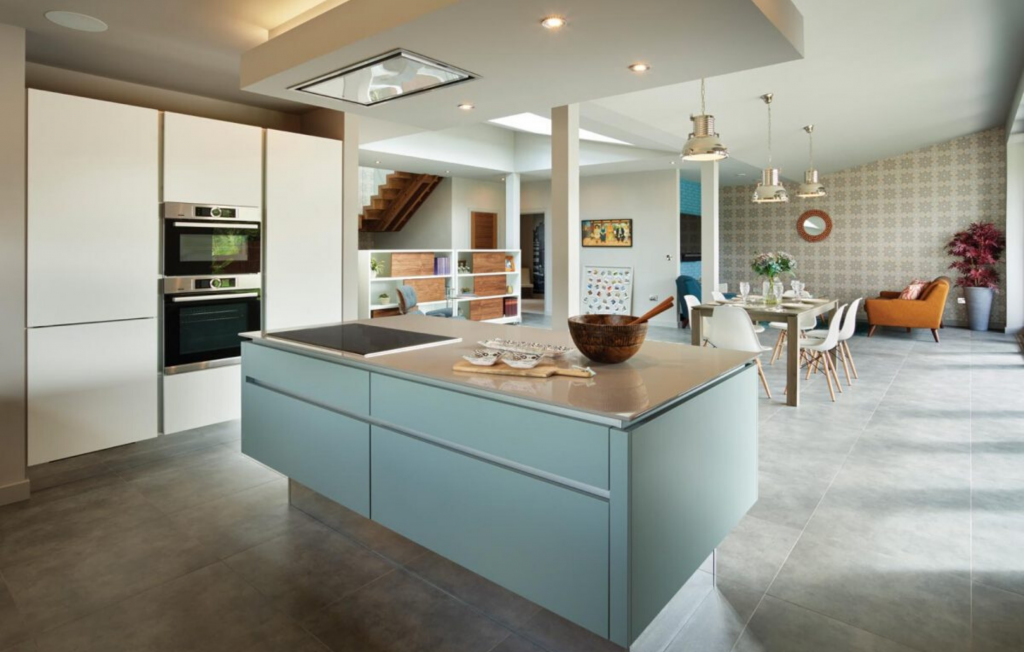
With so many options to choose from, you will need to think carefully about your budget and your lifestyle to ensure you choose the best worktop for your project. We always recommend getting a first-hand experience of the tactile and visual properties of the different worktop materials. We have a huge variety of samples and displays to explore at our Cambridge showroom. Alternatively, you can touch and feel our cutting-edge Dekton worktop for yourself at our St Neots Experience Centre. A member of our knowledgeable team will be on-hand to discuss your options and share their expertise, or you can get in touch with our friendly team now by calling 01223 904150 or emailing info@cambridgekitchens.co.uk.

